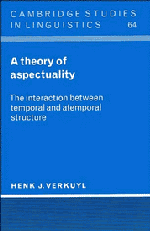Book contents
- Frontmatter
- Contents
- Preface
- Acknowledgments
- PART I ISSUES OF COMPOSITIONALITY
- PART II NOUN PHRASE STRUCTURE
- PART III TEMPORAL STRUCTURE
- 9 Homogeneity
- 10 Localism and additive structure
- 11 Event semantics and aspect construal
- 12 Aspect and perspective
- 13 Event construal
- 14 Testing the Plus-principle
- Conclusion to Part III
- Notes
- References
- Index
11 - Event semantics and aspect construal
Published online by Cambridge University Press: 05 July 2011
- Frontmatter
- Contents
- Preface
- Acknowledgments
- PART I ISSUES OF COMPOSITIONALITY
- PART II NOUN PHRASE STRUCTURE
- PART III TEMPORAL STRUCTURE
- 9 Homogeneity
- 10 Localism and additive structure
- 11 Event semantics and aspect construal
- 12 Aspect and perspective
- 13 Event construal
- 14 Testing the Plus-principle
- Conclusion to Part III
- Notes
- References
- Index
Summary
Introduction
An important issue emerging from the discussion so far is the status of events. In the present aspectual theory, events – here taken as eventualities in Bach's sense – are not primitive: they are construed. In the above extrapolation of Jackendoff's theory, events result from a mapping of Things and Paths into the set of events. There are also theories in which they are taken as primitives.
Let me underscore here the pointlessness of a debate about whether or not events are primitive individuals or complex dividuals. That matter can be settled by belief, or maybe by purely philosophical arguments. However, a debate about events as possible denotations of expressions in a natural language is meaningful if the debate is focussed on the question of whether or not they explain things that cannot be explained otherwise. I would like to operate on this assumption, which is another way of saying that it makes no sense to explain the notion of terminativity in sentences like (47), (48), (50) and (52) in terms of expressions like ∃(…e…), where e is a variable over eventualities or events. Of course, it is very handy to speak about events or eventualities but this does not mean that one is committed to their existence. It is just handy to have terms for things whose nature we do not understand well and whose existence we cannot be sure of.
Information
- Type
- Chapter
- Information
- A Theory of AspectualityThe Interaction between Temporal and Atemporal Structure, pp. 242 - 267Publisher: Cambridge University PressPrint publication year: 1993
